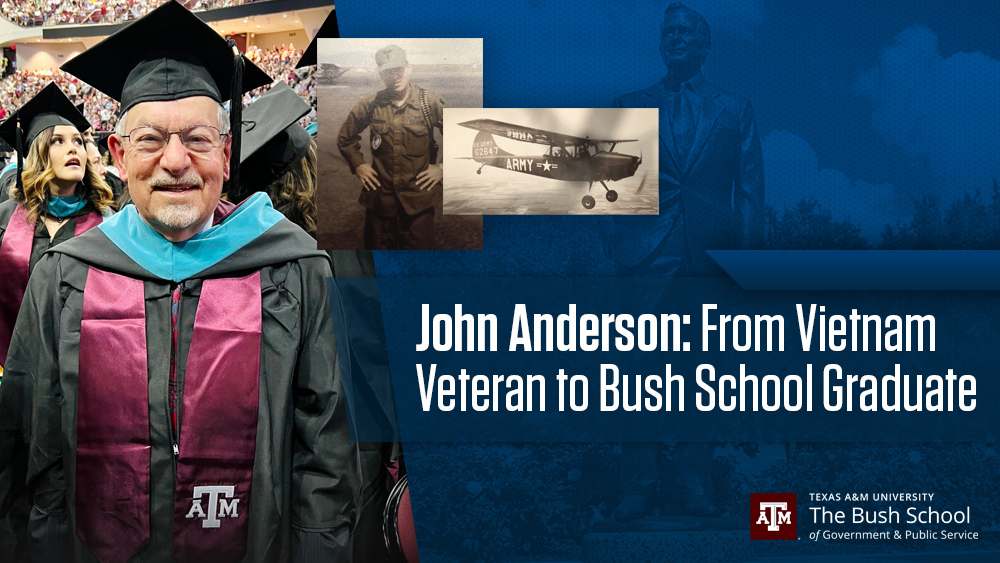
By Alexis Hixson
Now 77 years old, Bush School of Government & Public Service Alumnus John Anderson has survived 38 potentially fatal situations. After six active duty and 16 reserve years of US Army service, with 1 year in Vietnam, this is a notable accomplishment. Mr. Anderson’s life is a testament to the “men and women of character” Bush School namesake, President George H.W. Bush, described as the ideal student for his new School of Government and Public Service.
“If you’ve had even one or no potentially fatal situations in your life, you ought to ask yourself: Why am I here? What am I supposed to do for others? How am I going to be of service to other people?” Anderson’s commitment to service has been the driving factor over the course of his life and his experience at the Bush School. He graduated in May 2022 at the age of 77 from the Bush School of Government & Public Service with a Master of International Policy.
An Army Brat
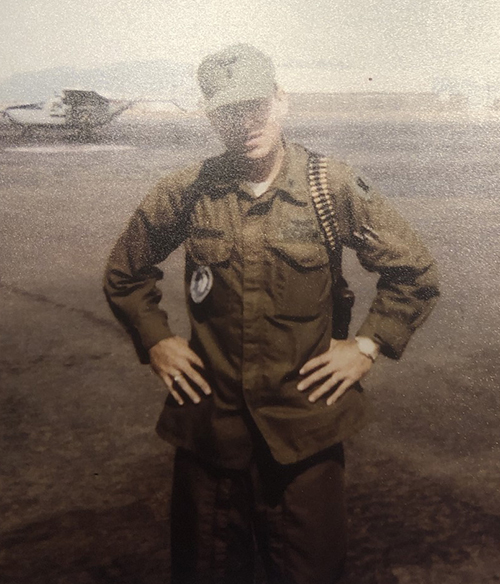
Anderson was born in Long Beach, California, a few days after his father departed for the Philippines in World War II. John Anderson Sr.’s deployment meant that he would not meet his son for 18 months. John’s father was the first and best example of service in his life.
“He was a remarkable man. Absolutely remarkable. And the people that knew him, loved him. Someone once told me, “the word ‘integrity’ in the dictionary should have his picture next to the definition,” Anderson said.
Mr. Anderson Sr.’s commitment to service in the Army caused John’s childhood to span continents. His family moved eight times before he reached the age of 18. John lived in Alaska, California, Georgia, Germany, New Jersey, Texas, and even Taiwan, inspiring his adaptability, adventurous spirit, and unique worldview. The lifestyle was not without its challenges.
“If you’re an Army brat or some other branch of the service, you learn how to meet people and make friends. And I made some friends, but I was very shy. So it wasn’t until after my sophomore year of college that my personality changed to the point that I’m considered by a lot of people to be obnoxious,” Anderson joked.
After years of nomadic life, John arrived in El Paso and attended school at Texas Western College, where he joined the ROTC, met his wife, Ann, and set his feet on a path that would take him towards a career in the military.
“In college I was in ROTC, and someone said, ‘Hey, if you’d like to consider flying for the Army you can take this written test. So I took the test, passed and went to ROTC Summer Camp where I took the flight physical. My first crash was during ROTC flight training. That was the first of three plane crashes, but that wasn’t one of the five times I’ve actually been scared. I was embarrassed, but not scared,” Anderson said.
One of the five scares occurred when Anderson used the wrong gun target line on an artillery mission, which could have endangered US troops in the area. Mr. Anderson explained that the remaining four times he has been truly afraid were for Ann’s health.
“Four of them were because of her. It’s not because she threatened me,” he joked, before turning somber. “It’s because her health has not been good. It’s been scary.”
“She has supported me in everything I’ve ever done, whether it impinged on her activities and her life, or just anything. No matter how stupid it was, she would find a way to support me. She even proofs my papers, and will for anybody else that needs help. She’s wonderful that way.”
A Vietnam Veteran
Anderson’s time in Vietnam was with the 2nd Flight Platoon of the 183rd Recon Aviation Company flying an O-1 Birddog observation plane for the U.S. Army. Many of the missions supported Charlie Company, 75th Rangers. He believed in serving the American people.
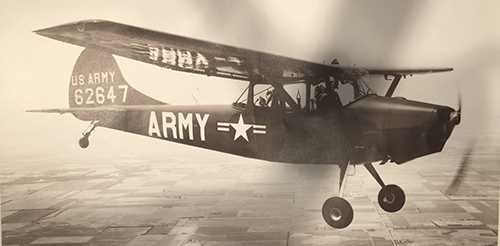
“I take pleasure in that my most important job was helping to get Americans out of trouble. That was more important than fighting the enemy, more than hurting anybody,” Anderson said.
Though rewarding, this was not an easy task. John often flew over the thick triple canopy jungle which distinguished much of the terrain of Binh Thuan Province, Vietnam.
“This location consisted of a 20-30 mile coastal plain, then mountains of up to 5,000 feet and triple canopy jungle. You get to know the terrain pretty well.”
Anderson’s experiences in the war gave rise to several other close calls, including a depleted gas tank, a fire on a wing and a night in a valley below the clouds with no radio aid to navigation and no artificial horizon. Anderson also supported Charlie Company’s Long Range Reconnaissance Patrols (LRRPs) as they searched for North Vietnamese.
“There was a LRRP team that had been jumped by a large body of North Vietnamese in the jungle. With triple canopy, there’s very little vegetation at ground level since not much light gets through. I never saw the patrol team, and I never saw the North Vietnamese, but I fired artillery to keep the North Vietnamese off their backs until they reached an LZ (Landing Zone) and were picked up. That was a very important event to me,” Anderson said.
A New Beginning
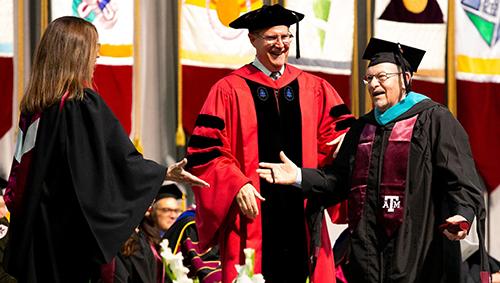
After Anderson left active duty he moved to Houston, Texas to work with Merrill Lynch for what would become a 45-year long career. While with Merrill, he joined the U.S. Army Reserves 75th Maneuver Area Command. Anderson was promoted to Major and assigned to the Armored Cavalry Regiment Exercise Group as the Operations Officer (S-3). Anderson would serve in this unit for 12 years before moving to Bryan/College Station (B/CS), Texas after accepting the position of Merrill Lynch office manager, continuing to live a life of service. Before John arrived, the Bryan office was ranked near the bottom of all Merrill Lynch offices in Texas. John was informed when he accepted the position that, if he couldn’t turn the office around within a short period, it would be closed. “In September of 1985 I went to my first managers’ meeting in Dallas and someone actually said “At least we’ll beat Bryan.”
By 1989, John and the team of financial advisors and staff had worked a miracle, elevating the office to the number four office in the nation in a key measurement and was greatly improved in many others.
An Adopted Aggie and Bush School Student
The Andersons have been fans of Texas A&M and the Aggie community since 1976, attending football games for years before moving to B/CS. He chose to pursue Certificates in Nonprofit Management and Advanced International Affairs after his friend, an Aggie and a retired Army Colonel, encouraged him to attend the Bush School. The Advanced International Affairs certificate goal became that of a Masters of International Policy when it was pointed out how few additional hours were needed.
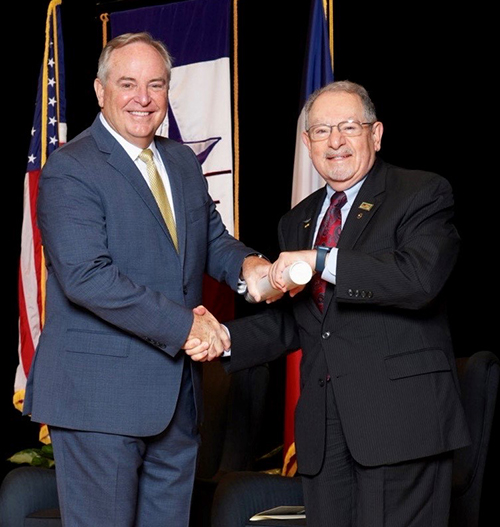
During his tenure at the Bush School, Mr. Anderson met multiple outstanding faculty members, and he especially appreciated Dean Mark Welsh, Professor Gregory Gause, and Professor Jim Olson. John explained that Jim Olson’s Intelligence and Counterintelligence classes were two of the most
impactful classes at the Bush School. He appreciated Dr. Gause’s knowledge and sense of humor and Dean Welsh’s exceptional public speaking abilities. His professors were always willing to help, as were his fellow students.
“My professors were very considerate; not just of me; but of the students in general. They often asked, ‘how can we make this a more valuable experience for the students?’”
“Professor Olson’s intelligence class just blew the doors off for me. Every now and then, he’d say “put down your pencils,” and he would tell a story. I’m not the kind of person who gets on the edge of my seat, but if I were, I would have been. A couple of them were pretty emotional.”
John was able to share his own unique experiences with Bush School students, offering a valuable, first-hand perspective on the events in Vietnam, while emphasizing that no one knows everything about it.
“In one of Olson’s classes, we were talking about the role the CIA played in Vietnam. They hadn’t mentioned a program I knew a little about. I asked, “Have you considered covering the Phoenix program?” Professor Olson requested that John share information about the Phoenix program and his experiences with it. He has also shared his own story in Professor Greg Vogle’s class.
A Wise Advice Imparter
Anderson’s commitment to service is matched by his humility. Many people praise his wisdom, but John says, “I’m not so sure about that. I have had a lot of experiences, and it is said that from experience comes, wisdom. But I don’t think I’m all that wise.”
His advice to Bush School students to heed the calling to serve wherever possible rings true. “For most of my life, but especially the last years here in Bryan-College Station, many people have come into our lives as a friendship or needing some kind of help. It can be minor, or it can be major, but you must try. One of the songs that was played when I was flying in Vietnam was “Bridge over Troubled Water.” Having those experiences, and having people come into my life where there’s a little something I can do…I have to try. And it’s a pleasure to do! Look for opportunities to be someone’s bridge over troubled water, remembering that someday you may need one.”
